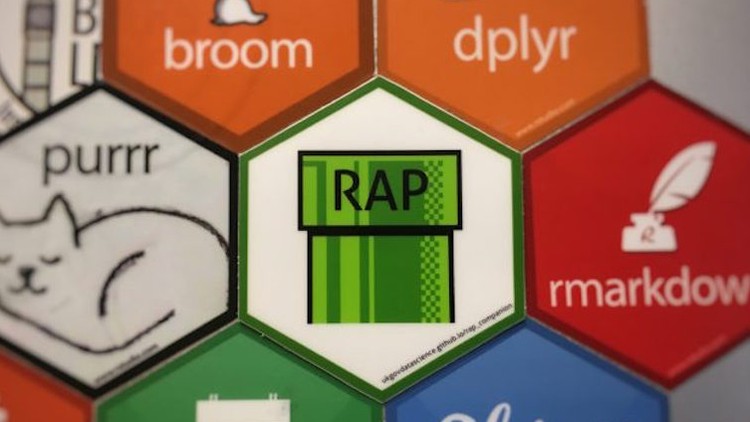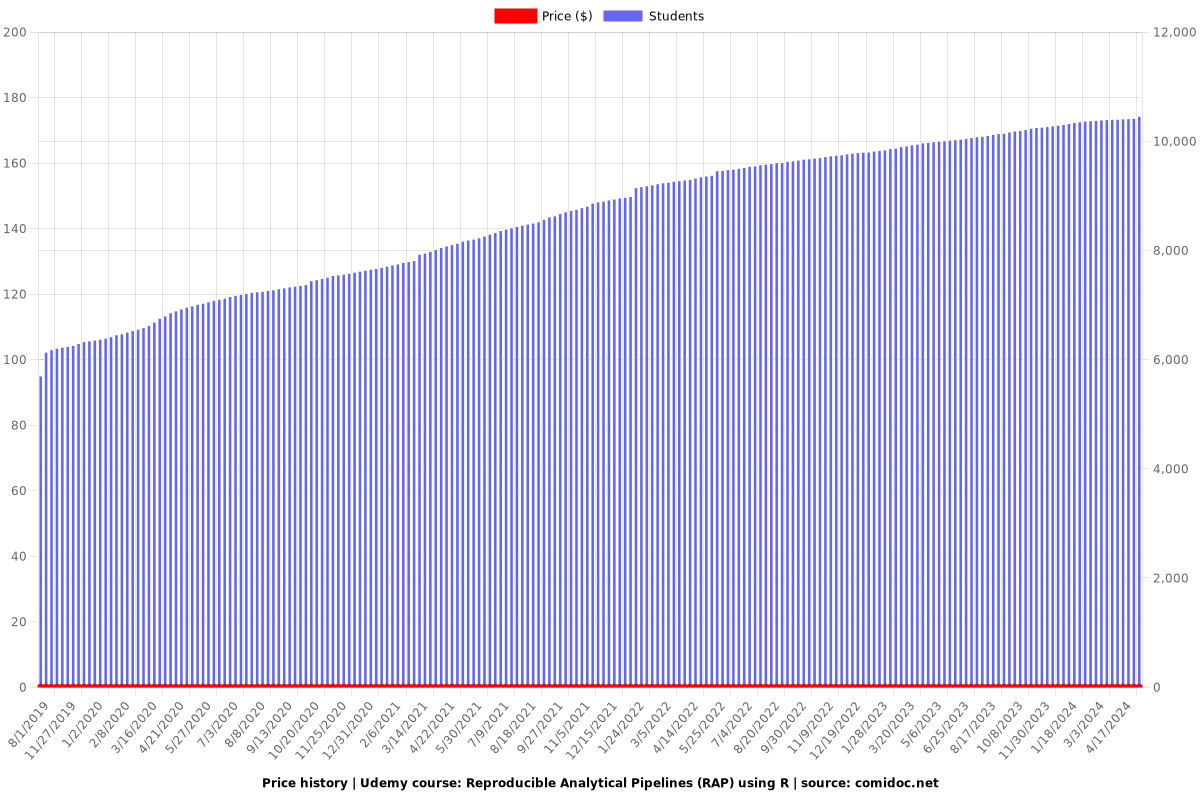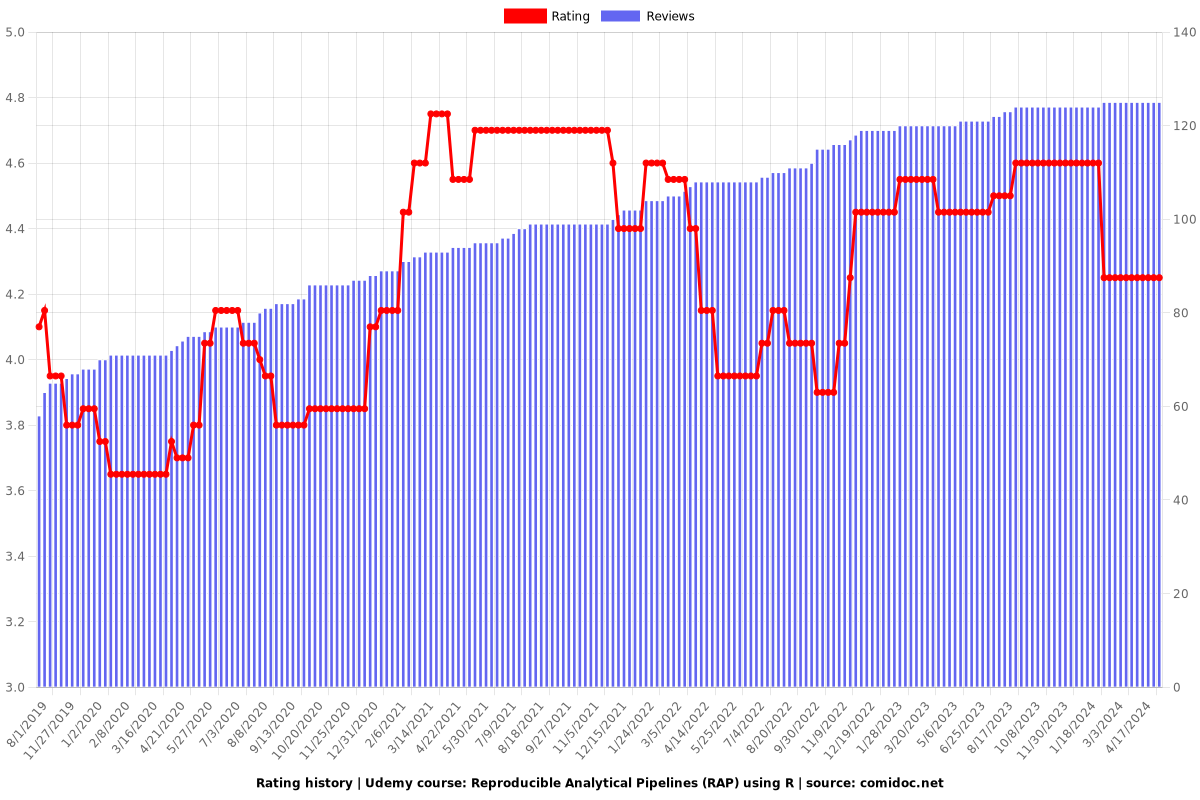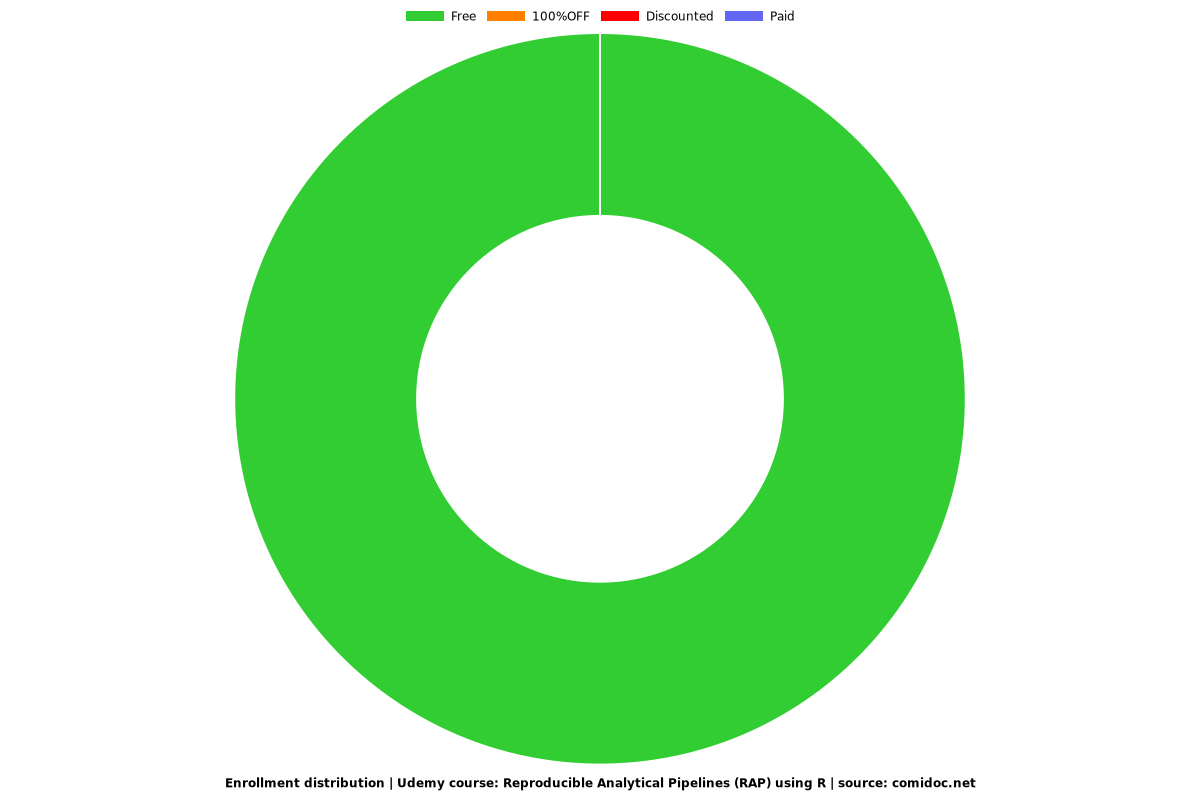Reproducible Analytical Pipelines (RAP) using R
Automating the production of statistical reports using DataOps principles.
4.25 (125 reviews)

10,417
students
7 hours
content
Mar 2019
last update
FREE
regular price
What you will learn
Use DevOps to improve the production time and quality of your statistical reports.
Build a reproducible analytical pipeline enshrining business knowledge in an R package.
Automate the production of a periodic report.
Why take this course?
📘 **Course Title:** Reproducible Analytical Pipelines (RAP) using R
🚀 **Course Headline:** Automating the production of statistical reports using DataOps principles
🎉 **What You'll Achieve:**
- **Identify Opportunities**: Spot where Reproducible Analytical Pipelines (RAP) can streamline processes at your organization.
- **Data Management**: Derive the minimal tidy dataset necessary to produce all the figures, tables, and statistics from a chosen report.
- **Version Control Mastery**: Utilize basic git functionality for version control and track your progress with an audit trail.
- **Collaborative Skills**: Engage in Github collaboration using a standard workflow with pull requests for peer review to ensure consistent quality assurance.
- **Software Development**: Create an R package that encapsulates the business knowledge, reflecting reproducibility and quality assurance standards.
- **Efficiency & Quality**: Apply Open Source software development tools and principles, including functional programming, unit testing, continuous integration, and dependency management to enhance production time and the quality of your statistical reports.
- **Time for Innovation**: Free up time by automating routine tasks and focus on more intriguing challenges.
**Course Description:**
In this comprehensive course, you'll dive into the world of Reproducible Analytical Pipelines (RAP) using R, leveraging DataOps principles to revolutionize how you produce statistical reports. By the end of this course, you will have a solid understanding of how to:
- **Select and Define**: Choose the right report within your organization that can benefit from automation and define the minimal dataset required for its production.
- **Version Control**: Learn the ins and outs of using git for version control, which will provide an essential audit trail of your work.
- **Collaborative Workflow**: Discover how to collaborate on Github effectively with a standardized workflow that includes pull requests for peer review, ensuring that each contribution to your project is vetted and meets high-quality standards.
- **Software Craftsmanship**: Develop an R package from the ground up, enshrining your organization's business knowledge in software that can be reused and maintained with ease.
- **Quality Assurance**: Implement best practices for Open Source software development, including functional programming, unit testing, continuous integration, and robust dependency management to ensure that your pipeline is reliable and maintainable.
🔍 **Key Topics Covered:**
- Introduction to Reproducible Analytical Pipelines (RAP)
- Tidy Data Principles
- Version Control with Git
- Github Collaboration & Workflow Best Practices
- Software Development with R
- Functional Programming in R
- Unit Testing and Quality Assurance
- Continuous Integration Strategies
- Dependency Management
- Packaging Your Solution for Production Use
**Learning Outcomes:**
By the end of this course, you will have not only mastered the creation of reproducible analytical pipelines using R but also be equipped with the skills to apply DataOps principles in your organization. This will enable you to produce high-quality statistical reports efficiently and with confidence, allowing you to allocate more time to exploring new challenges and opportunities.
🎓 **Who Should Take This Course?**
- Data Analysts
- Statisticians
- R Programmers
- Business Analysts
- Anyone interested in streamlining their data analysis workflow through automation and reproducibility.
🛠️ **Tools & Technologies:**
- R programming language
- Git version control system
- Github for collaboration and code hosting
- RStudio (IDE for R)
- Continuous integration services (e.g., Travis CI, GitHub Actions)
- Package development tools (e.g., devtools, testthat)
**DISCLAIMER:** The views and opinions expressed in this course are those of the author and do not reflect the official policy or position of GDS or the UK Government. 📢
Join us on this journey to elevate your data analysis capabilities with Reproducible Analytical Pipelines (RAP) using R, and embrace the future of DataOps! 🚀✨
Our review
---
**Overall Course Rating:** 4.25/5
**Course Review Summary:**
The course in question provides an comprehensive introduction to Reproducible Analytic Pipelines (RAP). It has been well-received by recent learners, with a range of feedback that highlights both the strengths and areas for improvement.
**Pros:**
- **Practical and Hands-On:** The course is described as project-oriented, offering a hands-on approach that is highly beneficial for learners looking to implement RAP in their workplaces. It emphasizes practical skills over theoretical knowledge, which many students appreciate.
- **Rich Resources:** The abundance of resources provided within the course is noted as a significant strength. Learners have access to a variety of tools and materials that are neatly packaged and organized, making it easier to follow along and apply what is learned.
- **Real-World Application:** The course takes students through the process of building packages from scratch, which is both educational and encouraging for those looking to expand their skill set in package development and RAP.
- **Expert Content:** The instructor's openness and thoroughness in presenting the material demonstrate a high level of seriousness and expertise in the content delivered.
- **Comprehensive Coverage:** The course covers a wide range of best practices in data science and software development, providing a summary that is both practical and applicable to solving domain business problems.
**Cons:**
- **Pacing and Content Delivery:** Some learners felt the course started slowly, with too much information spread over too many videos. This could potentially be overwhelming for newcomers or those expecting a more streamlined learning experience.
- **Technical Challenges:** The content covered some topics that were initially frightening or intimidating to some learners. However, the course's structure and instructional approach eventually made these topics more accessible.
**Review Highlights:**
- "Yes I have already started implementing RAP in my workplaces, but this is a good background to what I am doing." This feedback indicates that the course complements real-world application and can serve as a valuable reference for those who are actively applying RAP.
- "It takes me through the process of package building from the scratch which really encourages me to try." This reflects the course's effectiveness in guiding learners through the process of package development, fostering confidence to experiment and try new things.
- "He is open and doesn't hide a thing about what needs to be done. Through this you get to see his level of seriousness in his contents." This highlights the instructor's transparency and dedication to ensuring that learners understand all aspects of the course material.
**Conclusion:**
The Reproducible Analytic Pipelines (RAP) course offers a comprehensive learning experience for those interested in improving their coding practice, particularly within R and automation pipelines. The course's practical focus, rich resources, and real-world application make it stand out among other similar courses available on platforms like Udemy. While there are areas that could be improved in terms of pacing and content delivery, the overall feedback suggests that this course is one of the best for those looking to learn about RAP, with a rating of 4.25/5 indicating high satisfaction among its learners.
Charts
Price

Rating

Enrollment distribution

1445360
udemy ID
11/24/2017
course created date
8/1/2019
course indexed date
Bot
course submited by